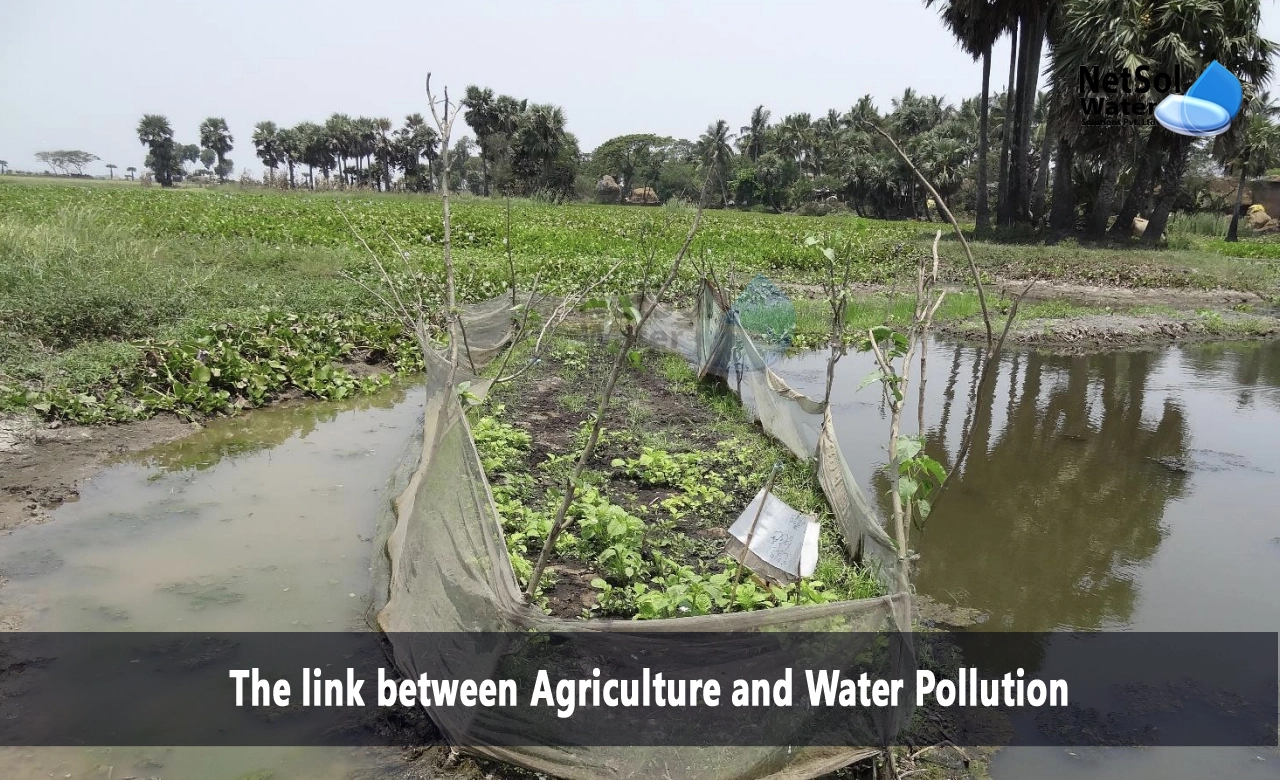What is the link between Agriculture and Water Pollution?
Agriculture is vital for feeding the world’s growing population. But modern agricultural practices also come at a steep cost to clean water resources. Agricultural pollution continues to degrade waterways worldwide through nutrient runoff, sediments, chemicals, livestock waste, and altered water flows. Addressing the complex relationship between farming and water quality remains an urgent yet surmountable challenge. In this blog, we’ll examine how agriculture pollutes water and promising solutions.
Key Pollutants from Agriculture
Agricultural activities introduce an array of contaminants that affect both surface waters and groundwater:
- Nutrients – Nitrogen and phosphorus compounds from fertilizers, animal manure, soil erosion stimulate excessive algae growth and eutrophication. This depletes oxygen levels, killing fish and aquatic ecosystems.
- Pesticides – Insecticides, herbicides, and fungicides applied on croplands wash into streams, rivers, lakes during rains. Many pesticides are acutely toxic even in tiny amounts.
- Sediments – Loose topsoil from farmlands clouds waters, blocks sunlight plants need, smothers aquatic habitat and spawning areas.
- Bacteria – Fecal coliforms from livestock, especially concentrated animal feeding operations (CAFOs) contaminate water, causing illness in humans.
- Heavy Metals – Compounds like zinc, arsenic, copper, and cadmium found in fertilizers, animal pharmaceuticals impact water quality.
- Salts – Salts from cropland irrigation drainage alter freshwater chemistry and can promote toxic algal blooms.
- Antibiotics – Used extensively in animal agriculture, trace antibiotics entering waterways contribute to antibiotic resistance in bacteria.
This complex agricultural pollution causes extensive damage, from algal blooms creating dead zones to contamination of drinking water supplies drawn from polluted rivers and groundwater.
Key Causes and Farming Practices
What farming methods and activities contribute most to agricultural water pollution?
- Over application of chemical fertilizers and manure to croplands, especially before heavy rains.
- Intensive livestock production generating huge volumes of nutrient-rich waste. Lack of proper manure storage facilities leads to runoff.
- Overgrazing that compacts soil and leads to erosion of exposed topsoil when it rains.
- Plowing up hillsides and cultivating sloped cropland susceptible to soil loss during precipitation events.
- Excessive use of pesticides for crop protection rather than integrated pest management techniques.
- Irrigating cropland inefficiently, generating irrigation return flows laden with sediments, salts, and agrochemicals.
- Lack of riparian buffers and vegetation alongside waterways to filter out pollutants from farm fields.
- Draining wetlands for agricultural development at the expense of ecosystems that naturally filter water.
These issues point to potential solutions focused on conservation farming methods that balance productivity and environmental protection.
Case Study: Chesapeake Bay Watershed
A case example that illustrates the heavy toll of agricultural pollution on water resources is the Chesapeake Bay watershed. The bay supports lucrative fisheries but has been severely degraded, with agricultural pollution among the main culprits. Decades of excessive nutrient inputs have spawned massive algal blooms that choke out aquatic life.
The 64,000 square mile Chesapeake watershed contains extensive agriculture, including concentrated animal feeding operations (CAFOs) that generate huge volumes of manure. Runoff of nitrogen and phosphorus enters the bay, depleting oxygen levels needed to support fish, crabs, oysters and other life. Algal blooms block sunlight from reaching vital underwater grasses. Sediments from farmland erosion also impede bay health.
Clean-up programs have made gradual progress, but the Chesapeake remains in poor ecological shape. Agriculture must significantly curb nutrient and sediment loading through improved conservation practices to restore the bay’s degraded waters.
Potential Solutions
How can the agriculture sector mitigate its impacts on water quality while still meeting food production needs?
Here are some promising approaches:
- Precision agriculture to fine-tune fertilizer and water use to optimize crop yields and minimize runoff.
- Conservation tillage techniques like no-till farming to protect soil from erosion. Plant cover crops in off-seasons.
- Improved animal waste management systems, including covered storage facilities to prevent leaks.
- Restoring wetlands and riparian buffer zones to filter out sediments, nutrients, and other pollutants.
- Carefully managing grazing lands and rotational grazing to avoid overgrazing and soil compaction.
- Integrated pest management to reduce pesticide use through biological controls and cultivation practices.
- Upgrading irrigation systems to the latest efficient technology, such as micro-irrigation.
- Establishing riparian forest buffers along waterways flowing through agricultural lands.
- Cover cropping and diversified crop rotations to enhance soil health and reduce erosion.
- Improved nutrient management planning when fertilizing croplands.
Through research, education, financial incentives, and stricter regulations where warranted, the goal of cleaner water and thriving agriculture can be aligned and realized, benefiting both farmers and society as a whole.
Outlook for Alignment
With advanced technology and greater ecological awareness, farming can feed humanity while minimizing collateral damage to water resources. This requires holistic attention to the entire food production system, not just crop yields. Sustainable solutions ultimately boost agriculture’s long-term viability by conserving the very lands and waters future generations will depend on. Through ongoing innovation, wisdom, and stewardship, society can secure water quality and food security together. The health of water and the health of agriculture are intertwined. Protecting both remains imperative in the quest to build a just and sustainable world.
Netsol Water is Greater Noida-based leading water & wastewater treatment plant manufacturer. We are industry's most demanding company based on client review and work quality. We are known as best commercial RO plant manufacturers, industrial RO plant manufacturer, sewage treatment plant manufacturer, Water Softener Plant Manufacturers and effluent treatment plant manufacturers. Apart from this 24x7 customer support is our USP. Call on +91-9650608473, or write us at enquiry@netsolwater.com for any support, inquiry or product-purchase related query.



